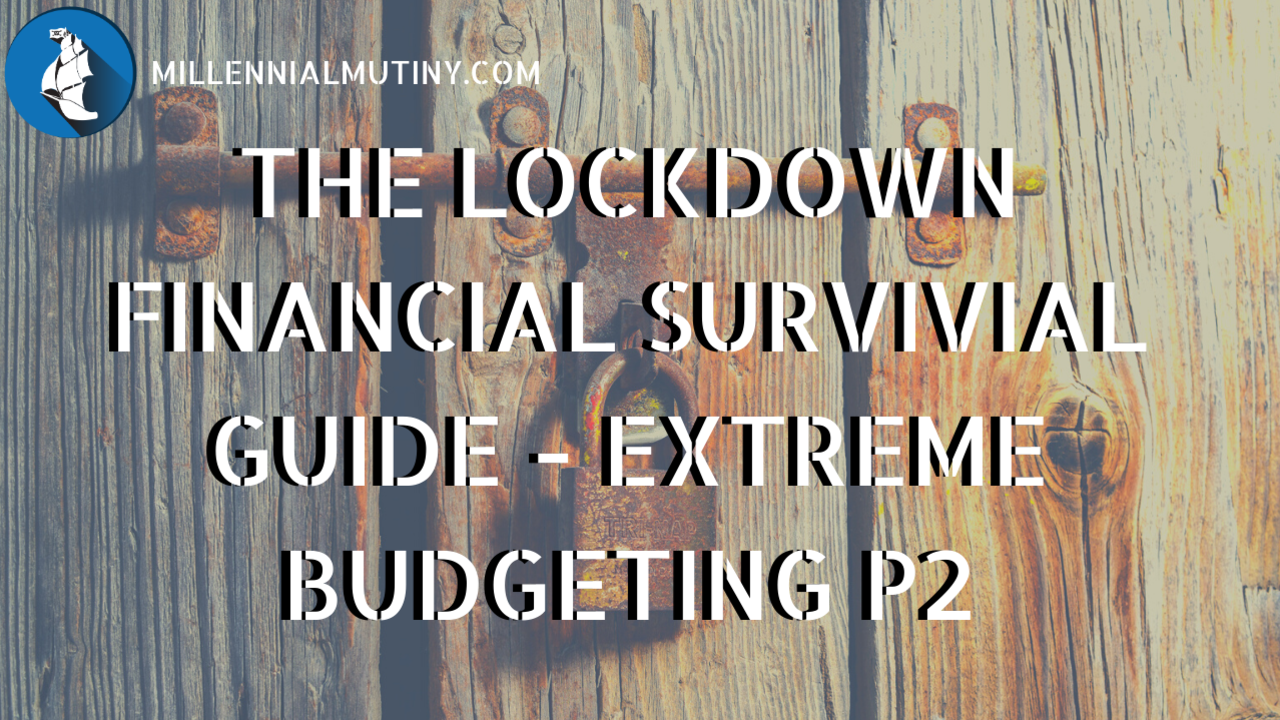The Lockdown Financial Survival Guide - Extreme Budgeting - Part 2

Welcome back.
Yesterday, we looked at how to create a budget based on what you have been spending over the past 12 months. This will act as your baseline - your starting point.
In these unusual times, a lot of people will need to cut back. Yesterday a record 6.6 million people registered jobless claims in the US and we have had just under 1 million people register for unemployment benefit in the UK. This crisis is hurting and a lot of people will need to cut back.
If you missed yesterdays post, go back and do the work there now - you won't be able to make any further progress unless you have a historic view on what you have been spending.
Today, we move onto phase 2 in our 4 step extreme budgeting plan, which looks like this:
Phase 1 - Check Your Past Spending
Phase 2 - Your New Reality
Phase 3 - Cutting Back
Phase 4 - Special Measures
Today, we are going to focus on the current situation and how it is impacting on your finances today.
Your New Reality
Now that you have your budget tracker all filled in over the past 12 months, you can see where you have been spending your money.
Many of us will want to cut back at a time like this and that is totally understandable. Even if you are not in financial trouble, you may still wish to think about how you spend money moving forward so that you will be better prepared if this kind of thing ever happens again (here's to hoping not!).
The thing is, the current situation means that you might not be spending in the way that you have before. In effect, the current situation has done some of the cutting back for you.
In my 'old' budget, I had £135 per month for eating out - not happening at the moment.
In my 'old' budget, I had £50 per month for days out and entertainment - not happening at the moment.
In my 'old' budget, I had a £400 per month holidays fund - not happening at the moment.
You get the picture!
Other Cost Savings
There are other cost savings which people are experiencing now too. If you used to travel into work, there is a good chance that you are working from home so your commute costs might have gone down.
If you have an annual season ticket for public transport - it might be worth checking if you can get a partial refund. I just refunded my annual train ticket (probably won't be using that for 3 months!) and got a refund of £4,800 just the other day! Well worth having in my book!
The coffee you bought on the way to work each day is probably not happening anymore (gosh I do hope you have coffee at home!). The lunch at the cafe, the cinema at the weekend - none of this stuff is happening at the moment.
Usually when you stop spending money on something, it is because you are instead spending on something else, where as my experience in this situation is that I am just spending less.
Look Before You Leap
Before you take any more extreme measure (and you may have to - more on this in the next few days), it is worth just doing a sense check on your current situation.
It could be that the lockdown has meant that your spending has reduced substantially, just because it has to.
A good exercise at this point, is to take your total budget for the past 12 months and duplicate or copy and paste the data into a new sheet (you will need it again soon enough once all this is over).
Now, go through that sheet and take out all of the things that you are not currently spending money on. Things like holidays, travel, eating out etc.
This will give you a good idea about your new reality for the next few months.
The Big Question
The big question at this point is are your finances sustainable at this level?
It could be that although your household income has gone down, your spending has gone down as well.
Heck, there is a slim chance you might even be better off stuck at home, especially if you are still being paid and working your normal job. In this case, you might have a once-in-a-lifetime opportunity to start saving and building up an emergency fund or to start investing.
Financial Resilience Part 1 - Emergency Fund
If your current spending is below your current income, then you are in good shape. Bunker down, work hard (your boss will need you to) and wait for the storm to pass.
If your current spending is still higher than your current income (perhaps because you have been furloughed or laid off), then we need to go further and that's what we are going to look at in part 3. Stay tuned for that in the next post.
Stay safe, stay home.
